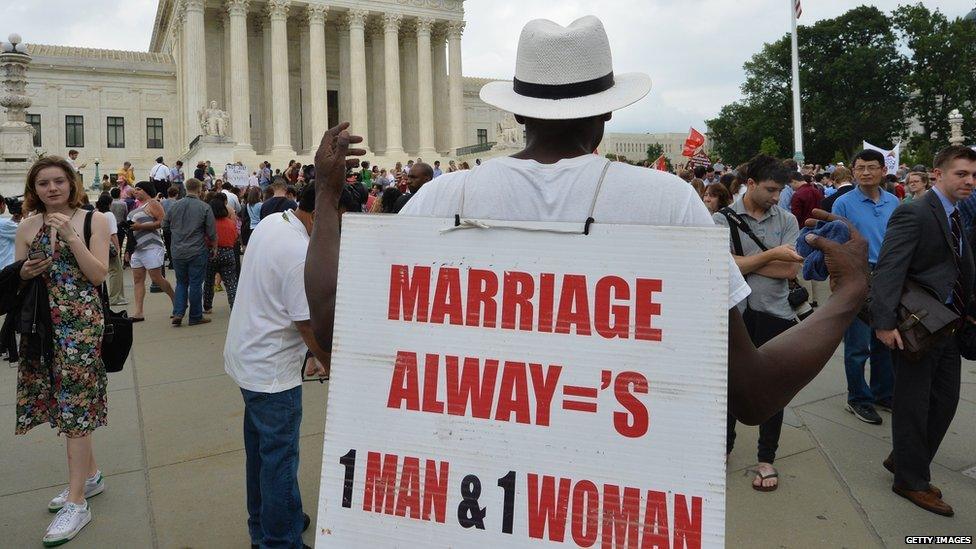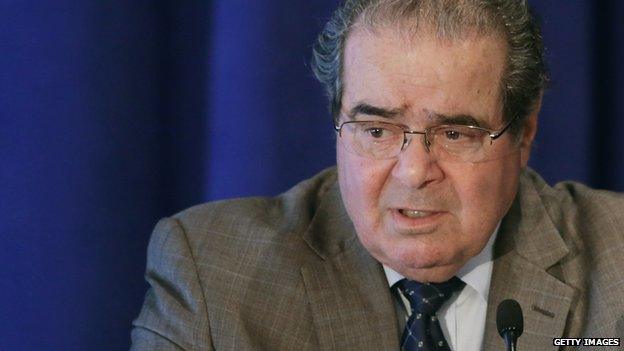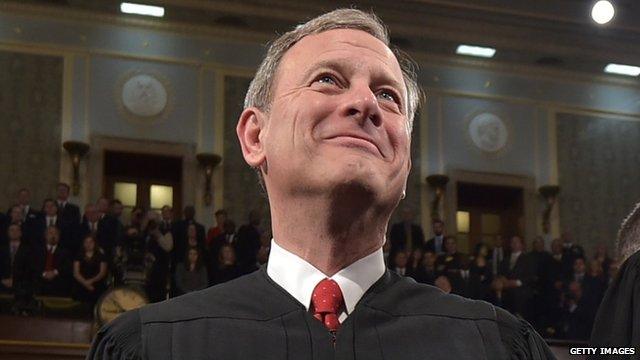Gay marriage: It's a 'judicial Putsch' warns dissenting Scalia
- Published

Four justices wrote dissents from the Supreme Court's decision legalising same-sex marriage throughout the US, but the ones by Justice Antonin Scalia and Chief Justice John Roberts were stylistic counterpoints.
Mr Scalia flashed anger, railing against an elitist majority on the Supreme Court who were imposing their values on "320 million Americans coast-to-coast".
"They are willing to say that any citizen who does not agree with that, who adheres to what was, until 15 years ago, the unanimous judgment of all generations and all societies, stands against the Constitution," he writes.
He called the decision a "judicial Putsch" and "a threat to democracy", in which the majority discovered a right to marriage that all the US legal minds before them had overlooked.
By broadening its interpretation of the Fourteenth Amendment equal protection of the law guarantee to include a universal right of same-sex marriage, he argued, the Court has given itself unlimited power. "It stands for nothing whatever, except those freedoms and entitlements this Court really likes," he writes.
Mr Roberts's dissent was more restrained, akin to a resigned shake of the head. He cloaked his opinion in warm words for the gay rights activists he knew would cheer the court's action.
"Many people will rejoice at this decision, and I begrudge none their celebration," he writes. "But for those who believe in a government of laws, not of men, the majority's approach is deeply disheartening."
He warns, however, that there is a dark side to achieving their objective by judicial fiat.
"However heartened the proponents of same-sex marriage might be on this day, it is worth acknowledging what they have lost, and lost forever: the opportunity to win the true acceptance that comes from persuading their fellow citizens of the justice of their cause," he writes.

Justice Antonin Scalia calls the gay marriage decision a "judicial Putsch"
It is the role of legislatures to determine social policy, he concluded, not judges.
Outside the court chambers, conservative commentators echoed these feelings of both anger and foreboding in their response to the decision.
The chief justice's opinion "blows the majority's opinion out of the water", say, external the editors of the Federalist.
"The majority opinion, as one might expect given the scant evidence that the plain text of the Constitution explicitly guarantees a right to gay marriage, is a total mess," they write. "It's tough to make a solid legal argument when you start with a conclusion - X is a good idea, therefore X is constitutional; Y is a bad idea, therefore Y is unconstitutional - and then reason backwards."
The Heritage Foundation's Ryan T Anderson tweets, external that the court's decision is a "significant setback for all Americans who believe in the Constitution, the rule of law, democratic self-government".
The National Review's David French leans, external more toward Mr Scalia's logic, as he contends that by making the case for marriage equality in terms of dignity and personal fulfilment, the court endorses a "secular theology of self-actualisation" that is incompatible with Christian faith.

John Roberts argues that the court's ruling takes the decision out of the hands of the people
"This is the era of sexual liberty - the marriage of hedonism to meaning - and the establishment of a new civic religion," he writes. "The black-robed priesthood has spoken. Will the church bow before their new masters?"
"Gay marriage isn't a game or a mere wedge issue," tweets, external Breitbart's John Nolte. "It's the camel nose in the tent in the left's ultimate goal of destroying the church."
Much of the media and corporate world hailed court's decision on Friday. Websites like the Huffington Post, Buzzfeed and Mediate added rainbow colours to their logos, as did companies like American Airlines and Chipotle.
Many conservatives are vowing to push back against the tide, however. According to RedState's Niel Stevens, conservatives need to take action.
"It's time to defy the court on this," he writes, external. "It's time to fight back. Nonviolent civil disobedience is the only option we have been left under this terrible ruling."